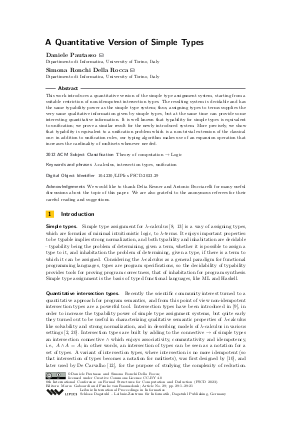@InProceedings{pautasso_et_al:LIPIcs.FSCD.2023.29,
author = {Pautasso, Daniele and Ronchi Della Rocca, Simona},
title = {{A Quantitative Version of Simple Types}},
booktitle = {8th International Conference on Formal Structures for Computation and Deduction (FSCD 2023)},
pages = {29:1--29:21},
series = {Leibniz International Proceedings in Informatics (LIPIcs)},
ISBN = {978-3-95977-277-8},
ISSN = {1868-8969},
year = {2023},
volume = {260},
editor = {Gaboardi, Marco and van Raamsdonk, Femke},
publisher = {Schloss Dagstuhl -- Leibniz-Zentrum f{\"u}r Informatik},
address = {Dagstuhl, Germany},
URL = {https://drops.dagstuhl.de/entities/document/10.4230/LIPIcs.FSCD.2023.29},
URN = {urn:nbn:de:0030-drops-180137},
doi = {10.4230/LIPIcs.FSCD.2023.29},
annote = {Keywords: \lambda-calculus, intersection types, unification}
}

 Creative Commons Attribution 4.0 International license
Creative Commons Attribution 4.0 International license
















